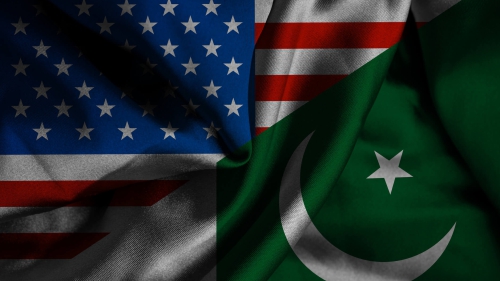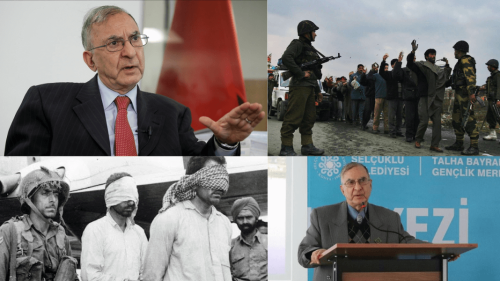US Congress and Kashmir Crisis

The possibility of a nuclear showdown between India and Pakistan cannot be ruled out, if the world fails to honor its pledge given to the people of Kashmir in the UN in 1948, assuring them the right to self-determination. The world cannot allow a nuclear disaster that might claim over one billion lives as well as irreparable damage to everything the human civilization has built over 5,000 years.
The showdown is not about a piece of land called Kashmir. It is not about who owns the beautiful valley of the land described by many as the paradise of the earth. It’s about two ideologies. One side believes in the suppression of people’s rights to promote hegemonic ideas shrouded in hatred and animosity, and the other stands for people's right to determine their own future freely and fearlessly.
India’s ruling elites have cut off Kashmir from the rest of the world by imposing curfew, by deploying almost one million armed personnel, and by arresting children, youth, women, and elderly who can walk and protest in the streets.
How many have been killed and tortured to death in Kashmir? No one is allowed to know, because the government of India has imposed draconian censorship. The satellite technology cannot estimate the number of people killed at homes and in the streets. But the satellite images give data about the number of protest rallies that have been held in Kashmir since August 5, when the people were asked to shut themselves in their homes.
Patients are dying at home. Young mothers are dying at home for being unable to go to hospital for delivering babies. Dialysis patients are losing lives because they cannot get the treatment and lack of medicine is creating a disaster of unheard proportion.
The power elites of Delhi are not ready to allow Kashmiris express their ideas freely and fearlessly. They have already bought and intimidate a great majority of journalists who are being mouth fed news about Kashmir. The government has become the biggest circulator of lies and false news.
The power elites in India belong to the RSS (an Indian right-wing Hindu nationalist organization) and its allied organizations including the BJP (pro-Hindu political party of post-independence India). The RSS believes in a minority free India. It reveres Hitler and Mussolini, the two well-known Christian fascists. It believes that India is only for Hindus and the minorities either have to leave the country or convert to Hinduism.
Kashmir was given a special status at the time of the independence because both India and Pakistan assured its people that they would have the right to choose either of the two countries for their final accession.
For almost 70 years the issue of Kashmir was forgotten. But India brought it out at the international level when it stripped Kashmir of special status and annexed it as a union territory against all its promises in the United Nations.
Since then almost anyone that matters in the world has spoken on the issue. And now the US congress members have also started bringing up the Kashmir issue with the context of human rights.
“I am excited to see so many members joining us in calling attention to what is happening in Kashmir. Please continue to call your members and ask them to speak up. We expect openness from India,” Representative Ilhan Omar, a Minnesota Democrat, tweeted, referring to a comment on Kashmir from Ted Lieu, a California Democrat in the U.S. House of Representatives. He tweeted that he had heard from his constituents that they were unable to reach their families in Kashmir. “Democracies like India should not be engaging in a communications blackout that has lasted over three weeks. We need de-escalation, not the hiding of what’s happening,” Lieu had said on Twitter, referring to a tweet from Representative Don Boyer, a Virginia Democrat.
The number of lawmakers commenting on Kashmir is likely to increase when the Congress reconvenes in September.
Additionally, the first Indian-American lawmaker in the House of Representatives, Pramila Jayapal also issued a statement saying that she was troubled over reports of arrests in Jammu and Kashmir after India revoked Article 370 of the constitution that granted special status to the state.
“We have taken this decision because we have found that over 70 years, the level of development in the State has been hampered by the so-called ‘special status’ that the State enjoys, which in any case was a temporary provision…,” Ambassador to the U.S. Harsh Vardhan Shringla had told Fox News earlier in August. “Deeply troubled by reports of Indian Govt’s arrests of 2,000 in Kashmir…,” Congresswoman Pramila Jayapal said in a statement.
“Democracy requires transparency, due process, and freedom of assembly and speech. These are absolutely essential even in the most complex of situations,” said Jayapal, who is considered as champion on human rights issues in the Congress. She also shared a New York Times news report on her Twitter account.
Moreover, Congressman Adam Schiff of California also said that fundamental human rights like free speech and access to information must be protected. Congressman Peter King of New York also met Indian Consul General in New York to discuss “India-Pakistan dispute” over Kashmir. “Met with Consul General of India to discuss India-Pakistan dispute over Kashmir. Told him I understood India’s action & had concerns over Islamist elements in Pakistan & Kashmir. But b/c of sensitivity & both countries being nuclear powers urged need to seek diplomatic solution,” King wrote. “Very concerned about the situation in Kashmir, particularly the ongoing communications blackout,” said Congressman Don Beyer.
All these statements indicate that the Kashmir issue is being viewed with utmost concern.
Topics: Human Rights, Kashmir, United States Congress
Views: 968
Related Suggestions

















